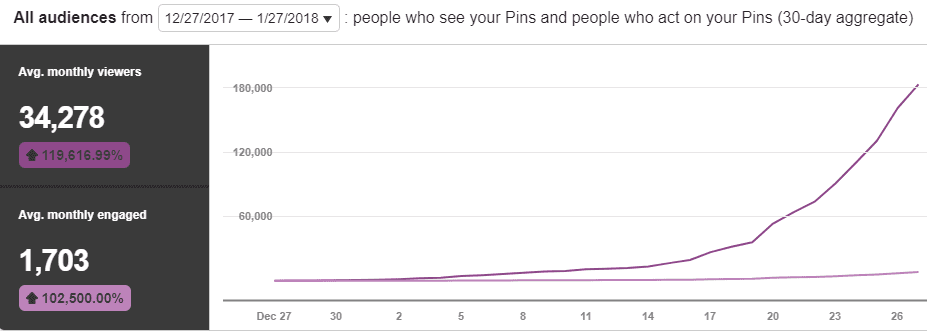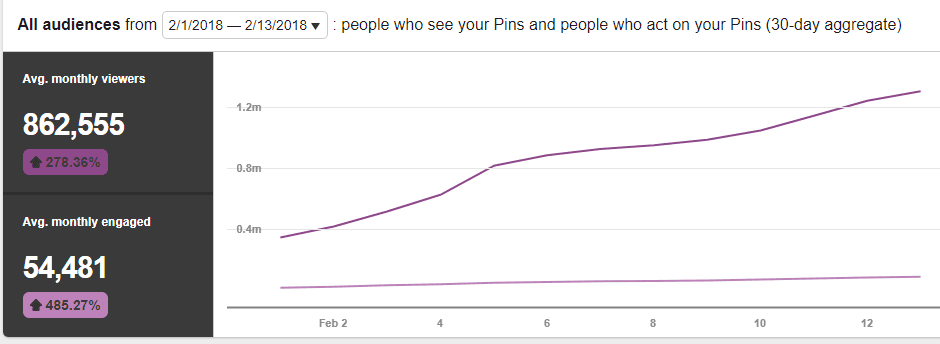Startups
Why You Should Use Pinterest to Grow Your Business

Raise your hand if you’ve been snubbing Pinterest. If your hand is raised, know that you’re not alone because also I used to. Mind you, about two years ago I did actually take the time to set up an account, yet that’s where my Pinterest relationship began and ended. I took a few minutes to look around and checked out. I felt like a squirrel on acid. Too chaotic, too many recipes and so much mom and baby stuff!
This isn’t for me. I’m a personal development blogger and an inspirational/motivational Facebook page owner. I thought Pinterest was no place for me because I post quotes and self help blogs. Due to this, I closed my mind off to it until December 27, 2017.
With the constant urging of a friend, I cautiously opened the Pinterest door again, almost like I was expecting some casserole to come out and smack me upside the head.
I looked around and much to my surprise and delight, there were other bloggers and business peeps just like me on Pinterest. I was instantly hooked. With a new appreciation for this beast, I dove in and got to work. I had 15 followers and no boards. After a few weeks of burning the midnight oil, getting Pin ready images for my blogs, resizing quote images from my Facebook page, creating boards, and joining tribes and other group boards, this happened.

It’s not just babies and crafts
If you are a blogger or business owner, Pinterest has a place for you. Let’s talk a bit about what it is and isn’t.
First and foremost, Pinterest is not a social media platform, it’s a search engine like Google but more colorful and fun. The great thing about Pinterest is that it has its own search engine within it. You can see what your people are searching for.
Another thing to note is people buy things on Pinterest. Lots of things! Check out this link for Pinterest stats! Now that you know what it’s not, let me tell you what it is. It’s a powerhouse traffic driver.
There’s power behind using Pinterest to drive traffic to your blog. Just take a look at these astounding facts:
- A pin is 100 times more spreadable than your average tweet
- Each pin can drive up to 2 page visits and 6 pageviews
- Ecommerce sites benefit from pinning as each pin can generate 78 cents
- The life of a pin is one week! Compare that to 24 minutes for Twitter and 90 minutes for Facebook. (source bloggingwizard.com)
In February of this year, my organic reach was just over 1.2 mil views! Remember, I started working it at the end of December with nothing.

It’s not as hard as you think!
It’s time consuming but definitely not hard. Take a minute to think about this, you work hard on your business. You want to reach people, sell things, inspire others, and teach through Pinterest. Don’t you think it would be worth your time and effort to work at something that will actually produce mind blowing results? Of course it would be!
Here are a few tips to get you started on Pinterest:
- Create a business account.
- Have a look around to see what other people in your niche are pinning. Take a look to see what pins attract your attention.
- Head over to Picmonkey or Canva and create some pins for your blog or your products. Images are everything! Take extra time on these, you want them to be engaging and you definitely want repins.
- Create boards and keep them secret until you have enough pins in them to go public. I usually wait until I have about 15 (as I’m creating new boards).
- Find groups to join so you can share your stuff and repin others. Groups and Tailwind tribes (you should join Tailwind-tons of my traffic comes from there) are key! Think of them as an online networking/marketing event. You need them. I checked out big pinners in my niche, had a look at the group boards they belonged to and then asked to join.
- Get active. Pin from other people’s boards, connect with others, join Facebook groups for pinners. Aim to pin 20–50 times a day. It’s really up to you how often you want to, I’ve settled for 30 a day. Don’t let those numbers frighten you. Tailwind takes care of that for you!
- Keyword your descriptions, boards, pins, everything! Remember, search engine.
Now get going!
Obviously there’s a tad more to it than that but once you get set up and get going, you will quickly become addicted to Pinterest (as I have) and be blown away at the growth of your business.
When you think about it, how much time are you spending (wasting) on social media platforms that just aren’t doing it for you? You’re pulling your hair out wondering why things aren’t working. Stop running the hamster wheel and head on over to Pinterest. It’s not just home decor, breastfeeding pumps and tuna salad recipes. There’s a whole other world you need to explore. If you discount it, you are leaving precious clients and money on the table.
“Social media is about sociology and psychology more than technology” – Brian Solis
Have you used Pinterest for your business before? If so, did you like it? Let us know your thoughts in the comments below!
Startups
15 Business Lessons From Napoleon’s Playbook

Unleash your business potential by harnessing Napoleon’s strategic genius.
From dreaming big and thinking bold to moving fast and staying agile, these time-tested tactics are your blueprint for success.
Learn how creative leadership, detailed planning, and relentless execution can transform your business landscape. Boost morale, lead with clarity, and embrace hard work to conquer your industry.
Don’t just survive—thrive with the power of Napoleon’s lessons.
Here are 15 Powerful Lessons You Can Learn From Napoleon Bonaparte
1. Dream Big, Think Bold
Napoleon wasn’t just playing small; he believed that “Imagination rules the world.” In the business world, boldness and creativity are game-changers. Don’t just aim to fit in—push boundaries and set ambitious goals that make you stand out.
Think of Steve Jobs, who didn’t just want to make computers; he wanted to revolutionize entire industries. Your vision should be so grand it almost feels unreachable. When you dream big, you inspire those around you to believe in the impossible and work together to achieve extraordinary outcomes.
2. Move Fast, Stay Agile
Napoleon’s quick and secretive moves gave him an edge. In business, you gotta be nimble. Adapt quickly, move fast, and you’ll often find yourself ahead of the game, capturing opportunities your competitors miss.
Companies like Amazon and Tesla thrive because they constantly innovate and pivot when needed. Speed is your friend; it allows you to react to market changes and customer demands faster than the competition, ensuring you remain relevant and ahead of the curve.
3. Creative Leadership
Napoleon thrived on chaos and wasn’t afraid to switch things up. Unlike rigid leaders, he was flexible and adaptive. In business, embrace change and let chaos work for you. Being adaptable can turn unpredictable situations into opportunities.
Think of how Netflix transitioned from DVD rentals to a streaming giant. Flexibility and creativity in leadership allow you to navigate through turmoil and emerge stronger, transforming challenges into stepping stones.
4. Organize Like a Pro
Napoleon’s mind was like a supercomputer, processing vast amounts of info to make smart moves. Businesses should do the same—stay organized, use real-time data, and adapt strategies based on fresh insights to keep that competitive edge.
Utilize modern tools like CRM systems, analytics software, and AI to manage information efficiently. Staying organized and informed means you can make better decisions, foresee potential issues, and react promptly.
5. Keep It Simple
Napoleon knew the power of simplicity. Overcomplicating things can bog you down. In business, streamline processes and focus on what truly matters to hit your goals efficiently.
Apple’s product design philosophy under Jobs was about simplicity and user-friendliness.When you remove unnecessary complexity, you reduce errors, speed up processes, and make it easier for your team to focus on what’s important, driving efficiency and effectiveness.
6. Execute Relentlessly
Once Napoleon decided on a course of action, he went all in. In business, once you pick a direction, pursue it with full commitment. Execution is where success is truly made.
Look at how Elon Musk commits to his vision for SpaceX and Tesla. Relentless execution means overcoming obstacles, staying focused on your goals, and not getting distracted by setbacks. It’s the determination and persistence in execution that ultimately leads to triumph.
7. Play to Your Strengths
Napoleon only fought battles he knew he could win. In business, focus on your strengths and avoid head-to-head fights in areas where you’re weak. Know your advantages and leverage them.
Microsoft leverages its strength in software development and cloud services rather than trying to compete directly in hardware. Understanding and maximizing your strengths ensures you play a game you can win, using your unique capabilities to outshine competitors.
8. Plan in Detail
Napoleon planned for every possible scenario. Businesses should do the same—conduct thorough planning and prepare for various outcomes.
Detailed planning helps you stay ready for anything. Scenario planning and SWOT analysis are tools that can help you foresee different futures and prepare accordingly. When you’re prepared for multiple scenarios, you can adapt smoothly and continue to drive forward, no matter what challenges arise.
9. Seize Opportunities
Napoleon saw luck as the ability to capitalize on accidents. In business, be prepared and ready to grab unexpected opportunities. Agility is key.
Companies like Uber and Airbnb seized gaps in the market by being ready to pounce on opportunities when they arose. Always be on the lookout for opportunities, and when they come, don’t hesitate. Preparation and readiness to act quickly can turn unexpected moments into major breakthroughs.
10. Learn from the Past
Napoleon studied the greats who came before him. Entrepreneurs should always be learning from the successes and failures of others. History is full of lessons waiting to be applied.
Warren Buffett is famous for studying businesses and market histories. By learning from the past, you can avoid repeating mistakes, understand what works, and build on proven strategies. Continuous learning from history helps refine your strategies and improve decision-making.
11. Boost Morale
Napoleon knew how to keep his troops motivated. Business leaders should do the same—keep your team inspired and engaged. High morale leads to high productivity.
Companies like Google and Salesforce invest heavily in employee well-being and motivation. When your team feels valued and motivated, they are more productive, innovative, and loyal. High morale fosters a positive work environment where people are excited to contribute and excel.
12. Lead with Clarity
Napoleon believed in the power of a strong, decisive leader. In business, clear direction and strong leadership are crucial. Ensure everyone knows the plan and follows it.
Leaders like Jeff Bezos provide a clear vision and direction, ensuring their teams know what they’re working towards. Clear, decisive leadership aligns your team, fosters trust, and drives coordinated efforts towards achieving your business goals.
13. Reflect on Failures
Napoleon analyzed both his wins and losses. Businesses should review their successes and failures to keep improving. Learn from mistakes to avoid repeating them.
Ray Dalio of Bridgewater Associates emphasizes the importance of learning from failure in his book Principles. By conducting post-mortems, you can understand what went wrong, make necessary adjustments, and continuously refine your strategies to avoid future pitfalls and drive success.
14. Action-Oriented
Napoleon was all about turning thoughts into actions. In business, decisiveness and execution are vital. Don’t just plan—act on those plans with energy and determination.
Entrepreneurs like Richard Branson embody this principle by constantly moving from ideas to actions. Action orientation ensures that you don’t get stuck in analysis paralysis but instead drive forward, making things happen and turning visions into reality.
15. Embrace Hard Work
By implementing these lessons from Napoleon, businesses can sharpen their strategies, strengthen leadership, and execute with precision, driving sustained success.
Startups
How to Manage Your Startup’s Finances More Efficiently
No matter how groundbreaking your product or service, your startup could quickly be on shaky ground without proper financial management

Running a triumphant startup requires juggling numerous responsibilities. From managing operations and coordinating with team members to developing innovative marketing strategies and nurturing relationships with clients, the to-do list seems endless. (more…)
Startups
5 Strategic Power Moves to Successfully Build Your Empire
Transitioning from idea to empire is a journey of strategic planning, execution, and constant evolution

The journey from a fledgling idea to a thriving empire is both exhilarating and daunting. The Startup Launchpad is not just a process but also a strategic framework that enables visionary entrepreneurs to become market leaders. This framework comprises five power moves, each a critical steppingstone in building a successful business.
These moves—Ideation, Business Plan, Online Presence, Strategic Marketing, and Launch and Growth—are the blueprint for turning aspirations into achievements. (more…)
Startups
How to Avoid Startup Clichés and Buzzwords When Pitching Investors
Using jargon can make you sound like you’re trying to fill space instead of providing meaningful data

Entrepreneurs frequently seek startup funding through a variety of channels. Yet, none seem as challenging as successfully pitching to experienced investors. After all, investors are pressed for time and eager for opportunities. These characteristics make it challenging to motivate them, especially if you’re bombarding them with a pitch full of jargon. (more…)
-

 Success Advice2 weeks ago
Success Advice2 weeks ago20 Creative Ways To Make Money From Home
-

 Success Advice2 weeks ago
Success Advice2 weeks ago7 Habits of Highly Effective Mediocre People
-

 Life2 weeks ago
Life2 weeks ago10 Ways Your Life is Like a Video Game
-

 Success Advice4 weeks ago
Success Advice4 weeks agoThe Self Awareness Secret: How Knowing Yourself Can Make You Wildly Successful
-

 Success Advice4 weeks ago
Success Advice4 weeks agoThe Self Determination Secret That’ll Propel You Forward in Life
-

 Motivation3 weeks ago
Motivation3 weeks agoWhy You’re Failing to Achieve Your Goals and How to Fix It Now
-

 Success Advice3 weeks ago
Success Advice3 weeks ago25 Lessons from Walt Disney’s Billion Dollar Business Playbook
-

 Success Advice3 weeks ago
Success Advice3 weeks agoReal Estate Strategies You Should Know About for Long Term Wealth






























2 Comments